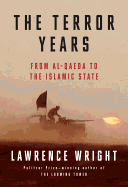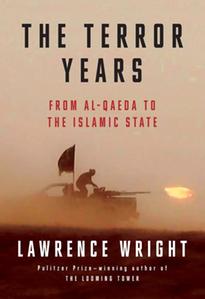
 Few journalists are as conversant with the frightening post-9/11 world than the New Yorker's Lawrence Wright, author of the Pulitzer Prize-winning The Looming Tower, an account of the events leading up to that tragic day. In The Terror Years, a collection of 11 pieces from the magazine, Wright carries the story forward, displaying equally incisive investigative skills and comprehensive reportage to describe the West's fight against terrorism, the intractable conflict in the Middle East and the rise of al-Qaeda's even more ruthless progeny, ISIS.
Few journalists are as conversant with the frightening post-9/11 world than the New Yorker's Lawrence Wright, author of the Pulitzer Prize-winning The Looming Tower, an account of the events leading up to that tragic day. In The Terror Years, a collection of 11 pieces from the magazine, Wright carries the story forward, displaying equally incisive investigative skills and comprehensive reportage to describe the West's fight against terrorism, the intractable conflict in the Middle East and the rise of al-Qaeda's even more ruthless progeny, ISIS.
Wright makes no secret of his disdain for the "long series of failures" that have characterized the United States' participation in the Middle East since 9/11. He explores both sides of the conflict in extended profiles of those involved. This includes Ayman al-Zawahiri, the Egyptian physician who took over leadership of al-Qaeda after the death of Osama bin Laden, as well as John P. O'Neill, the one-time head of the FBI counterterrorism section and bin Laden's tireless pursuer, who died at the World Trade Center on September 11, less than three weeks after taking over as the building's chief of security.
The collection's most poignant story is "Five Hostages," recounting the desperate, private efforts led by David Bradley, publisher of the Atlantic, to save Kayla Mueller and four other kidnapped journalists and activists. The beheadings of Mueller and three other hostages by ISIS in 2014 and 2015 first exposed most of the world to the depravity of that organization, "a proto-state that uses terror not just to conquer but to rule." But as Wright reveals in "The Rebellion Within," some former terrorists in Egypt, including one who provided the original intellectual underpinning for al-Qaeda's activities, have begun to question the wisdom of these barbaric tactics and the use of violence in general to achieve the movement's goals.
Because of the breadth and complexity of its subject matter, The Terror Years would have benefited from at least a brief chronology or the simple expedient of dating Wright's pieces. In some instances he does add helpful postscripts, as when he follows the essay "Captives"--an account of the 2006 kidnapping of Israeli soldier Gilad Shalit, and of Israel's Gaza military operation in 2008--with a mention of Shalit's exchange for 1,027 prisoners in 2011, as well as yet another clash between Israel and Hamas in the Gaza Strip in 2014.
Lawrence Wright's sobering journalism isn't likely to make his readers optimistic about a quick and painless victory in what he calls the "expensive and clumsy enterprise" that is fighting terrorism. But anyone who reflects on these thorough, thoughtful pieces will be better equipped to evaluate the prescriptions for waging that fight offered by those vying to lead it. --Harvey Freedenberg, attorney and freelance reviewer
Shelf Talker: New Yorker reporter and Pulitzer Prize-winner Lawrence Wright offers a well-informed perspective on the fight against terrorism and the conflict in the Middle East.

